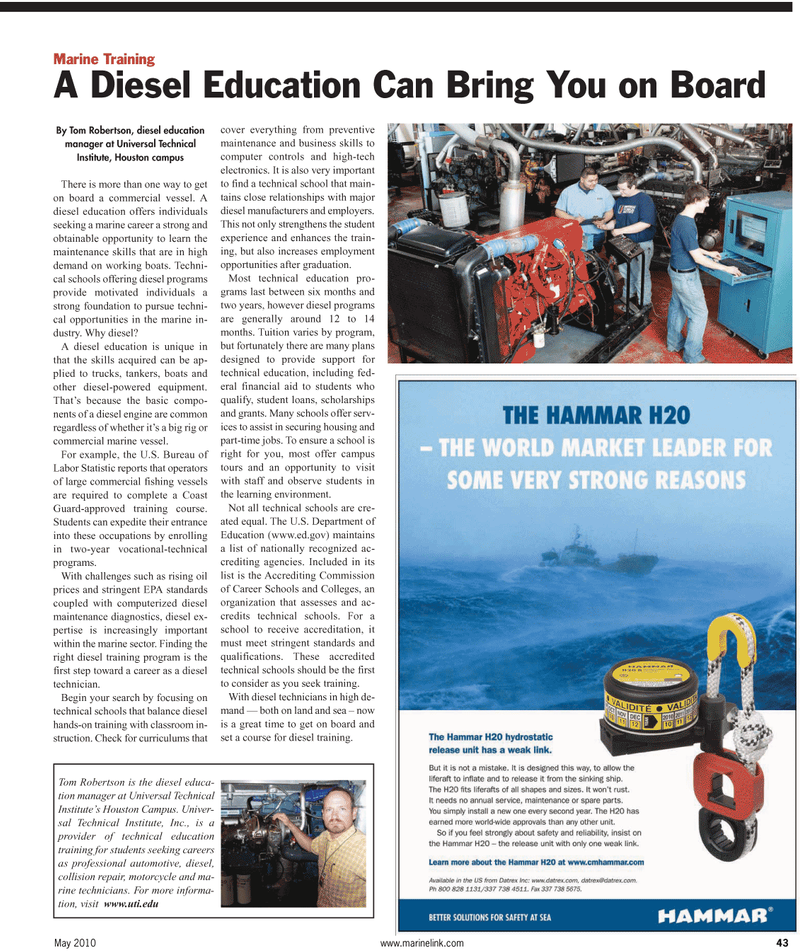
Page 43: of Maritime Reporter Magazine (May 2, 2010)
Read this page in Pdf, Flash or Html5 edition of May 2, 2010 Maritime Reporter Magazine
May 2010 www.marinelink.com 43
By Tom Robertson, diesel education manager at Universal Technical
Institute, Houston campus
There is more than one way to get on board a commercial vessel. A diesel education offers individuals seeking a marine career a strong and obtainable opportunity to learn the maintenance skills that are in high demand on working boats. Techni- cal schools offering diesel programs provide motivated individuals a strong foundation to pursue techni- cal opportunities in the marine in- dustry. Why diesel?
A diesel education is unique in that the skills acquired can be ap- plied to trucks, tankers, boats and other diesel-powered equipment.
That’s because the basic compo- nents of a diesel engine are common regardless of whether it’s a big rig or commercial marine vessel.
For example, the U.S. Bureau of
Labor Statistic reports that operators of large commercial fishing vessels are required to complete a Coast
Guard-approved training course.
Students can expedite their entrance into these occupations by enrolling in two-year vocational-technical programs.
With challenges such as rising oil prices and stringent EPA standards coupled with computerized diesel maintenance diagnostics, diesel ex- pertise is increasingly important within the marine sector. Finding the right diesel training program is the first step toward a career as a diesel technician.
Begin your search by focusing on technical schools that balance diesel hands-on training with classroom in- struction. Check for curriculums that cover everything from preventive maintenance and business skills to computer controls and high-tech electronics. It is also very important to find a technical school that main- tains close relationships with major diesel manufacturers and employers.
This not only strengthens the student experience and enhances the train- ing, but also increases employment opportunities after graduation.
Most technical education pro- grams last between six months and two years, however diesel programs are generally around 12 to 14 months. Tuition varies by program, but fortunately there are many plans designed to provide support for technical education, including fed- eral financial aid to students who qualify, student loans, scholarships and grants. Many schools offer serv- ices to assist in securing housing and part-time jobs. To ensure a school is right for you, most offer campus tours and an opportunity to visit with staff and observe students in the learning environment.
Not all technical schools are cre- ated equal. The U.S. Department of
Education (www.ed.gov) maintains a list of nationally recognized ac- crediting agencies. Included in its list is the Accrediting Commission of Career Schools and Colleges, an organization that assesses and ac- credits technical schools. For a school to receive accreditation, it must meet stringent standards and qualifications. These accredited technical schools should be the first to consider as you seek training.
With diesel technicians in high de- mand — both on land and sea – now is a great time to get on board and set a course for diesel training.
Marine Training
A Diesel Education Can Bring You on Board
Tom Robertson is the diesel educa- tion manager at Universal Technical
Institute’s Houston Campus. Univer- sal Technical Institute, Inc., is a provider of technical education training for students seeking careers as professional automotive, diesel, collision repair, motorcycle and ma- rine technicians. For more informa- tion, visit www.uti.edu

 42
42

 44
44
